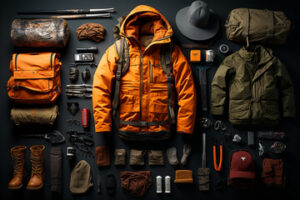New hunters can get overwhelmed when they walk into a hunting store with aisles full of camouflage clothing and accessories. A simple, comprehensive hunting checklist can help beginners ensure they have all the gear they need for a successful hunt.

Whether it’s cutting rope, notching hunting tags, or dressing game, a knife is one of the most essential pieces of hunting equipment for rookies. Other essentials include navigation equipment like a map and compass or GPS tools. Shop at Bugle For Elk for Premium Hunting Gear
A backpack is the foundation of any backcountry hunt. Beginners should be careful not to over pack their first hunts. An overly heavy pack will slow you down, add stress to your body, and reduce the time you spend scouting for game or enjoying the beautiful wilderness.
A high quality hunting backpack is designed to carry everything you need for a hunt without adding too much extra weight. For most beginners, an internal frame backpack is ideal to allow for more mobility and less strain on the shoulders. A pack should also have easy to access pockets for storing gear and adjustable straps to ensure it’s comfortable and fits you well.
Lastly, a pack should have an ample amount of storage for food, gear, and clothing. A pack like the KUIU Zippered Dry Bag is perfect for holding anything from food, water, and survival gear to maps, trail cameras, and a game bag.
Another essential part of a backpack is a first aid kit. Having a well-stocked first aid kit can help you respond quickly and efficiently to any injury that might occur during a backcountry hunt. This OL Sportsman First Aid Kit is specifically geared for hunters and includes non-adhering dressing, Leukotape, and ibuprofen.
While all the right gear can make a huge difference in your success as a beginner hunter, it’s important to remember that there are some things that can’t be replaced. A good night’s sleep, a healthy diet, and plenty of water are essential to making sure you have the energy needed to stay in the field all day. Taking the time to properly prepare for your next backpack hunt will ensure that your experience in the backcountry is as enjoyable as possible.
Snacks
When it comes to hunting gear essentials, the list is lengthy. From proper clothing and footwear to the appropriate firearms, quality optics, a functional backpack, suitable decoys, scent eliminators and game carriers, you need to bring all of the necessary items to maximize your comfort and performance. Other important accessories include orange tape for marking your location in the wilderness, a map and GPS, and walkie-talkies to stay connected with your fellow hunters. A freezer is also a good idea for storing your meat.
Water
Water is a life-sustaining resource that plays a role in all known forms of life. Without it, none of us would survive. It is the universal solvent, and it carries many of the essential chemical building blocks of all living things. A good quality personal water filter (like a LifeStraw) is a great addition to any hunter’s backpack. It can be lifesaving in an emergency situation. Other handy items include water purification tablets, a lighter, tinder, windproof matches, flint and steel or a firesteel, and a portable saw. Also, a bluetooth camera trigger is very handy for getting photos without having to use timers.
First Aid Kit
The woods can be a dangerous place, and even the most experienced hunters can suffer from accidents or mishaps. A basic first aid kit is vital for any hunter, and it can help you to address minor injuries, like cuts, blisters, and bee stings. In addition, a first aid kit will ensure that you are prepared in the event of a more serious accident or emergency.
A first aid kit should include items such as antiseptic wipes, bandages, medical tape, and an emergency blanket. It is also important to have a fire-starting kit, including water purification tablets and a lighter or flint and steel. A survival knife and a sewing kit with safety pins are other essential items for any hunter. Finally, a whistle and signal mirror are important for safety, and they can be used to attract rescuers in the event of an emergency or accident.
When you’re hunting in remote areas, a GPS device can be a vital piece of equipment for navigation and keeping track of your location. It’s a good idea to bring along a map and compass as backup, especially if you’re going to be hunting in a wilderness area that doesn’t have a lot of landmarks to guide your way. It’s also important to have a way to communicate with others in the field, such as walkie-talkies or a cell phone. Lastly, make sure to pack toilet paper, a cooler, food, extra ammo, and odorless insect repellent. These little things may seem insignificant, but they can really make a difference when you’re miles away from the nearest convenience store.
Clothing
If you’re a beginning hunter, walking into a sporting goods store can feel like an overwhelming experience. With aisle after aisle of camouflage gear and hunting accessories, it’s hard to know where to start.
While every hunting trip will be different, there are some basics that you should always have with you. Aside from your hunting weapon and ammo, be sure to have a reliable backpack, plenty of snacks, a water bottle, first aid kit, and appropriate clothing. Don’t forget to pack a pair of high-quality hunting socks that will wick moisture, prevent blisters, and keep you comfortable on long hikes or in wet weather conditions. A knife is also a must-have for cutting ropes, notching hunting tags, and dressing game. Finally, bring along a good book or hunting magazine to pass the time.